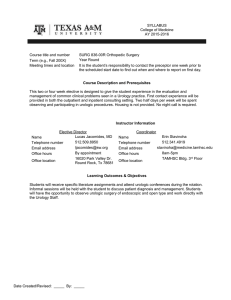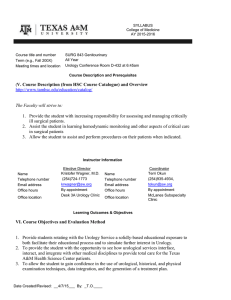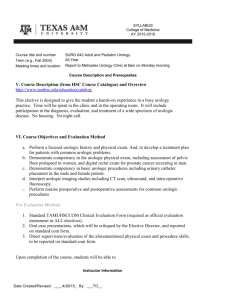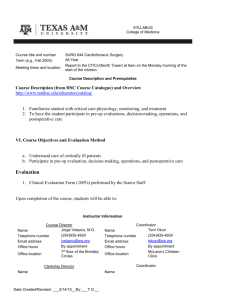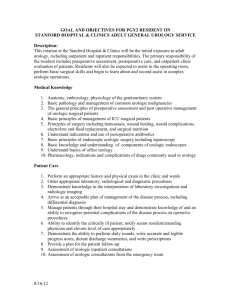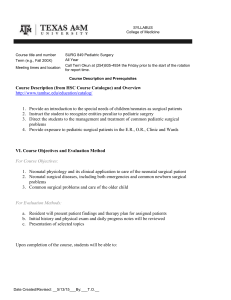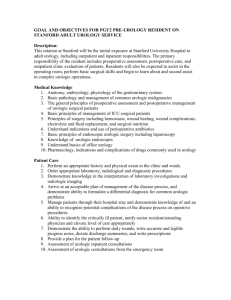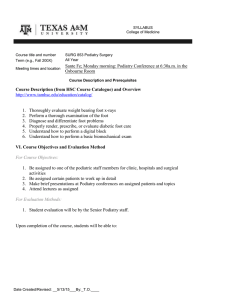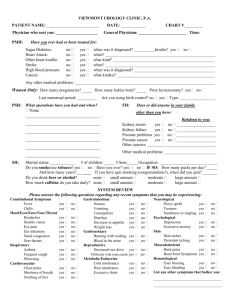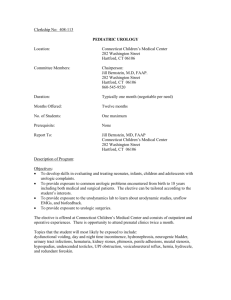Report to the Urology Conference Monday morning at 6:45a.m. in
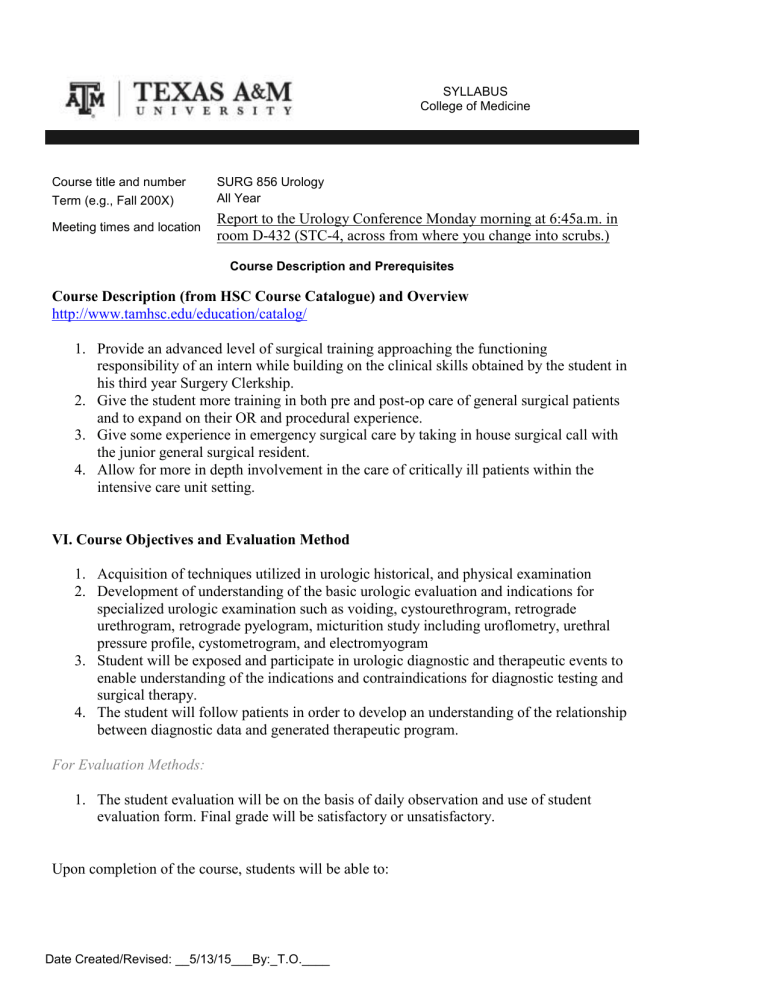
SYLLABUS
College of Medicine
Course title and number
Term (e.g., Fall 200X)
SURG 856 Urology
All Year
Report to the Urology Conference Monday morning at 6:45a.m. in
Meeting times and location room D-432 (STC-4, across from where you change into scrubs.)
Course Description and Prerequisites
Course Description (from HSC Course Catalogue) and Overview http://www.tamhsc.edu/education/catalog/
1.
Provide an advanced level of surgical training approaching the functioning responsibility of an intern while building on the clinical skills obtained by the student in his third year Surgery Clerkship.
2.
Give the student more training in both pre and post-op care of general surgical patients and to expand on their OR and procedural experience.
3.
Give some experience in emergency surgical care by taking in house surgical call with the junior general surgical resident.
4.
Allow for more in depth involvement in the care of critically ill patients within the intensive care unit setting.
VI. Course Objectives and Evaluation Method
1.
Acquisition of techniques utilized in urologic historical, and physical examination
2.
Development of understanding of the basic urologic evaluation and indications for specialized urologic examination such as voiding, cystourethrogram, retrograde urethrogram, retrograde pyelogram, micturition study including uroflometry, urethral pressure profile, cystometrogram, and electromyogram
3.
Student will be exposed and participate in urologic diagnostic and therapeutic events to enable understanding of the indications and contraindications for diagnostic testing and surgical therapy.
4.
The student will follow patients in order to develop an understanding of the relationship between diagnostic data and generated therapeutic program.
For Evaluation Methods:
1.
The student evaluation will be on the basis of daily observation and use of student evaluation form. Final grade will be satisfactory or unsatisfactory.
Upon completion of the course, students will be able to:
Date Created/Revised: __5/13/15___By:_T.O.____
Name
Telephone number
Instructor Information
Course Director
Kristofer Wagner, M.D. Name
(254)724-1773
Coordinator
Terri Okun
Telephone number (254)935-4934
Email address kwagner@sw.org
Email address tokun@sw.org
Office hours
Office location
By appointment
Desk 3A Urology Clinic
Office hours
Office location
By appointment
McLane’s Children
Clinic
Name
Clerkship Director
Name
Coordinator
Telephone number Telephone number
Email address Email address
Office hours Office hours
Office location Office location
Clerkship Director
Name
Telephone number
Email address
Office hours
Office location
Clerkship Director
Name
Telephone number
Email address
Office hours
Office location
Clerkship Director
Name
Telephone number
Email address
Office hours
Office location
Name
Telephone number
Email address
Office hours
Office location
Coordinator
Name
Telephone number
Coordinator
Email address
Office hours
Office location
Office hours
Office location
Name
Telephone number
Coordinator
Email address
Learning Outcomes & Objectives
1.
Each student will work directly with the Urology Staff. He will be assigned to clinical duties by the coordinator and supervised within those duties by a staff member. The student will receive specific literature assignments and attend urologic conferences while on the service. A resident will participate in the supervision of the student's daily activity and the teaching of the student. Informal sessions will be held with the student to discuss patient diagnosis and management. The student will have the opportunity to observe urologic surgery of endoscopic and open type. The student will be invited to
Date Created/Revised: __5/13/15___By:_T.O.____
present a talk on a urologic topic, and he will participate in the choice of the topic. The student will actively participate in the pyelogram conference.
2.
Primary Reading Resource will be General Urology, Dr. R. Smith, Lang Medical
Publication, 1995. Reference sources are: Campbell's Urology, 6th edition, W. B.
Saunders Co., Vol. I, II, and III, ed., Harrison, Guiddus, Perlmuther, Stamey, & Walsh;
Urology and Childhood, B. Innes Williams, Springer-Burleg; Urologic Surgery, James
F. Glenn, ed., Harper and Row. Emmett and Whitten, Clinical Urography, W. B.
Suanders Co., Hamburger, Nephrology, W. B. Saunders Co.
3.
Adequate self-teaching material will be made available in the Urology Clinic and library consisting of literature printed and videotaped.
COM Competency Based Learning Objectives: http://medicine.tamhsc.edu/academicaffairs/curriculum/objectives/
Principles and Guidelines for Curriculum Development: http://medicine.tamhsc.edu/policies/pdf/curriculum-principles-guidelines.pdf
Course Objective:
Acquisition of techniques utilized in urologic historical, and physical examination.
Development of understanding of the basic urologic evaluation and indicatons for specialized urologic examination such as voiding, cystourethrogram, retrograde urethogram, retrograde pyelogram, micturition study including uroflometry, urethral pressure profile, cystometrogram, and electromyogram.
Student will be exposed and participate in urologic diagnostic testing and surgical therapy.
The student will follow patients in order to develop an understanding of the relationship between diagnostic data and generated therapeutic program.
Click here to enter text.
COM Competency
Based Learning
Objectives
(CBLO):
Choose an item
Choose an item
Choose an item
Choose an item
Choose an item
Taught (T) and/or
Evaluated (E):
Taught AND
Evaluated
Evaluation:
Clinical
Performance
Rating/Checklist
Taught AND
Evaluated
Taught AND
Evaluated
Clinical
Performance
Rating/Checklist
Clinical
Performance
Rating/Checklist
Taught AND
Evaluated
Clinical
Performance
Rating/Checklist
Choose an item Choose an item
Textbook and/or Resource Material
1.
Urologic Library located in the Division of Urology includes urological texts, periodicals, and audiovisual tapes
Date Created/Revised: __5/13/15___By:_T.O.____
Grading Policies
Satisfactory 70-100
GRADING SCALE
Unsatisfactory 69 and below
Should the course director determine remediation is required, the remediation plan will be at the discretion of the course director and on a case by case basis depending on the issues involved.
Remediation plans could entail some (or all) of the following examples: Additional clinical shifts, research papers, presentations, article reviews, exams, directed reading, web-based modules, etc. If the student performance results in a failure of the elective, it will be recommended that the elective be taken again in its entirety.
Attendance and Make-up Policies
A component of professionalism is to be present, prepared, and punctual. In the event of a personal illness, critical illness within your immediate family, family death, or other extenuating events, please communicate this to the clerkship director or administrator in a timely manner. TAMHSC – COM student handbook states: Students who miss more than 20% of a 4th year elective for any reason (2 weekdays during a two-week rotation or 4 weekdays for
4 week rotation) will require a remediation plan. Elective director will consider students attendance and remediation if the student is requesting extended time off during interview season.
Students will adhere to the same work schedules as the attendings and/or residents. Students are required to attend morning report, patient rounds and Journal review.
Resources: Texas A&M Health Science Center Medical Student Handbook.
VIII. Policies and Procedures (generic information for all campuses)
Responsibilities and Expectation of Students
Students are expected to be present for the various clerkship activities that will be noted by your residents and staff.
Attendance is expected at the various clinical activities including morning ward rounds, operating room when assigned, third year lecture series, afternoon rounds, conferences, and any activity specifically requested by your attending.
Students are expected to be punctual for all of the various activities noted on the weekly schedule. Failure to adhere to the schedule will result in undue delays and inconveniences to patients, students and faculty. However, your tolerance of any last minute schedule changes in lectures is asked. Sometimes trying to arrange a lecture series with surgeons is full of unforeseen scheduling changes
Dress and Appearance: In order to be accepted as a member of the health care team, it is important to assume the same basic manner of dress, appearance and conduct as the other members of the team. A picture name identification tag must be readily visible on your shirt or coat collar, with introduction of your full name including “Ms.” or “Mr.” or “medical student”.
If the parent/patient refers to the student as a “doctor”, it is the student’s duty to correct this error. One should not misrepresent his/her role.
Date Created/Revised: __5/13/15___By:_T.O.____
Resource: Texas A&M Health Science Center Medical Student Handbook.
Course Topics, Calendar of Activities, Major Assignment Dates
(List major didactics, simulations, and test dates by week. Must include dates on which major exams will be given and assignments will be due and should not be changed without notification of all students in the course. Include a statement that all dates are subject to change. Include major topics, assignments, etc. Reference where an up to date schedule can be accessed. INCLUDE an INITIAL or
REPRESENTATIVE schedule in the appendix. THIS INFORMATION HAS BEEN PLACED HERE FOR
REFERENCE ONLY. PLEASE REMOVE BEFORE PREPARING SYLLABUS.
)
Week Topic Required Reading
Other Pertinent Course Information
Urology is a 2 week rotation. Students will adhere to the same work schedule as the attending and/or resident.
Americans with Disabilities Act (ADA)
The Americans with Disabilities Act (ADA) is a federal anti-discrimination statute that provides comprehensive civil rights protection for persons with disabilities. Among other things, this legislation requires that all students with disabilities be guaranteed a learning environment that provides for reasonable accommodation of their disabilities. If you believe you have a disability requiring an accommodation, please contact Disability Services, in Cain Hall, Room B118, or call 845-1637. For additional information visit http://disability.tamu.edu
Any student with a disability who needs accommodation should inform the instructor at the beginning of the course.
Academic Integrity
For additional information please visit: http://aggiehonor.tamu.edu
Date Created/Revised: __5/13/15___By:_T.O.____
“An Aggie does not lie, cheat, or steal, or tolerate those who do.”
Professionalism and integrity Statement (Academic Honesty and Plagiarism)
All College of Medicine students are required to comply with the student code of conduct and the academic integrity and honesty standards published in each component’s Student Handbook. Disciplinary action will be taken in accordance with the policies of each component. Students found guilty of Academic Dishonesty will receive an “F”/Unsatisfactory in the course. For a full list of actions qualifying as academic dishonesty, please review the College of Medicine Student
Handbook at http://medicine.tamhsc.edu/student-affairs/docs/handbook.pdf
.
According to the Aggie Honor System Office, plagiarism is defined as the appropriation of another person's ideas, processes, results, or words without giving appropriate credit. Intentionally, knowingly, or carelessly presenting the work of another as one’s own (i.e., without crediting the author or creator). Plagiarism and other academic misconduct definitions can be viewed on the Aggie Honor System Office website; http://aggiehonor.tamu.edu/RulesAndProcedures/HonorSystemRules.aspx#definitions .
TAMHSC E-mail Access and FERPA
The College of Medicine is communicating all official information to students through the students’ TAMHSC e-mail accounts. Please check the account frequently during the semester for updates.
This course is supported with web-based and/or e-mail activities. In order to take advantage of these additional resources and participate fully in the course, you have been assigned an e-mail address by the Texas A&M Health Science Center.
This e-mail address is for internal use only, so that faculty may communicate with you and the entire class. By registering for this course, you are agreeing to allow your classmates to have access to this e-mail address. Should you have any quest ions, please contact the TAMU’s Office of the Registrar at 979-845-1031 .
The Family Educational Rights and Privacy Act of 1974 (FERPA), which the HSC complies fully, is intended to protect the privacy of education records, to establish the rights of students to inspect and review their education records and to provide guidelines for the correction of inaccurate or misleading data through informal and formal hearings. Students also have the right to file complaints with the Family Educational Rights and Privacy Act Office of the Department of Education in Washington, D.C., concerning alleged failures by the HSC to comply with the act.
Mistreatment of Students
The College of Medicine is committed to providing a positive learning environment in which students can meet their academic goals based on mutual respect in the teacher/learner relationship. Both parties must be sensitive to the needs of others and differences in gender, race, sexual orientation, religion, age or disability. As outlined in the Student
Handbook under the section titled Standards of Conduct in the Teacher-Learner Relationship, belittlement, intimidation and humiliation are unacceptable for effective learning and undermine self-esteem. Breaches involving student mistreatment may result in a faculty or staff member being sanctioned or the loss of faculty and/or staff appointment.
These policies address student mistreatment involving College of Medicine employees, residents, affiliate staff, or patients. Mistreatment may be reported through the College of Medicine telephone hotline, 1(855)-397-9835 or through an online form at http://medicine.tamhsc.edu/current/student-mistreatment-form.html
. For a full list of reporting avenues, please refer to the Student Handbook under the Mistreatment Policy.
Exposure and Occupational Hazard
The Needle Stick Policy and Bloodborne Pathogen Exposure information for Medical Students may be accessed in the
Student Handbook at: http://medicine.tamhsc.edu/student-affairs/docs/handbook.pdf
Note: More information is available on the aforementioned topics to all students on the College of Medicine website.
Date Created/Revised: __5/13/15___By:_T.O.____
